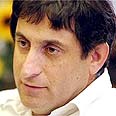
Bidding Washington farewell – Sallai Meridor
צילום: אלכס קולומויסקי
Goodbye, ambassador
US envoy Sallai Meridor's decision to return to Israel praiseworthy
WASHINGTON – Sallai Meridor, Israel's ambassador in Washington who just announced his decision to return, did not attempt to gain a few more months in the desirable post by clinging to it. He decided not to embark on internal political games via his Likud connections, instead opting for new norms of conduct that deserve to be emulated in Israel's public life.
Such move is customary in America's public life, yet in the US there are no coalition governments, but rather, an elected president who exclusively selects his people. When George W. Bush was elected president in 2000, thousands of Clinton Administration officials ended their term at once and left Washington. The process repeated in the wake of Barack Obama's election victory.
On the other hand, in Israel we have coalition governments, and many public servants do not feel duty-bound to the prime minister of all people. Israel saw six election campaigns since 1996, and in many cases we saw ambassadors remaining in Washington even though they were not assigned by the incoming prime minister.
When Ehud Barak arrived at the White House as prime minister for a historic meeting with Syrian Foreign Minister Farouk al-Sharaa, our ambassador in Washington was Zalman Shuval, who was appointed by previous PM Benjamin Netanyahu. Shuval was an esteemed ambassador, but he was not one of Barak's people and was not brought into the talks. He spent most of his time at television studies in order to explain Israel's position – an important part of the ambassador's job – but not at the White House.
Sallai Meridor could have gained a few more months in Washington and could have enjoyed the respect and perks that America's capital can offer foreign ambassadors, yet Israel's interests would have been undermined. Therefore, Meridor did what every public servant should be doing: He received his mandate from Prime Minister Olmert and Foreign Minister Livni, so he returned it to them and left it up to PM-designate Benjamin Netanyahu to select his man or woman in Washington.
Officials in Washington quickly identify the people who can be used to relay and receive messages vis-à-vis Israel's prime minister. They quickly find out what the fastest and most reliable channels are. Ambassador Meridor would have entered the category of an ambassador who deserves respect and perks, but no more than that.
Working behind the scenes
Moreover, officials at Israel's Washington embassy, just like officials at other missions in the US capital, are desperately attempting to identify the true sources of power in President Obama's new Administration, in order to create effective work relations. This mission is at a nascent state – and what kind of motivation can we expect of an ambassador who knows that he has limited time to undertake the required preparation work?Those who know Sallai Meridor know that he is uninterested in issues of respect or perks. Visitors to the ambassador's resident in Washington were stunned to see him and his wife personally serving food to their guests. Some will interpret it as a weakness, yet Ambassador Meridor did not push himself into the front row of White House events, or events anywhere else for that matter, even though he deserved it in the framework of his post.
Meridor did not fight to appear on television, and this was his weak point as an ambassador in Washington. He wanted to do his job quietly, behind the scenes. Israeli correspondents in Washington were often frustrated with him. He is a person who has a firm grasp of the diplomatic material and of Jewish issues, and he dedicated most of his time to briefings with American reporters as well as members of the Administration and of Congress on the Iranian threat – which he viewed as the highlight of his mission.
Meridor can boast some achievements: During his short term, we saw the signing of a defense memorandum that granted Israel military aid to the tune of $30 billion in the next 10 years. We also saw a memorandum of understanding signed between the two countries in respect to addressing arms smuggling to Gaza. In addition, there were the preparations for the Annapolis process, as well as the preparatory work for the transition between the two US Administrations.
When Sallai Meridor arrived in Israel ahead of Secretary of State Hillary Clinton's visit, he may have hoped to hear Netanyahu asking him to stay at his post, and perhaps he did not hear it. This was enough for Sallai Meridor to announce that he is returning home.










